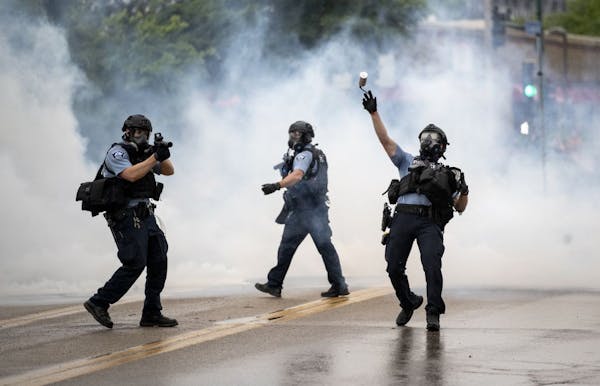Ahead of a pivotal vote about the Minneapolis City Council's plan to remake policing, an analysis of the proposal shows the council faces legal barriers to eliminating officers.
Even if the proposal makes it onto the November ballot and voters approve it, elected officials will have to wade through a series of "thorny" and "perhaps vexing" issues, including state laws that allow only licensed peace officers to carry out critical tasks, according to an analysis by the city attorney's office recently released by the city.
The Minneapolis Charter Commission could bring the process to a halt Wednesday if it votes to keep reviewing the measure rather than recommending it show up on November's ballot. In public hearings and thousands of public comments, the commission has come under pressure by both sides in the fight over whether the Minneapolis Police Department should be dismantled after the killing of George Floyd.
Before the commissioners now is a proposal, written by five City Council members, that would end the requirement to maintain a Police Department with a minimum force based on the city's population. Instead, the city would be required to create a Department of Community Safety & Violence Prevention, which could include officers.
If it survives the Charter Commission — plus additional review by the council and mayor — Minneapolis residents would vote Nov. 3 on whether to approve the new measure. The city would have weeks to adopt its 2021 budget, which would play a key role in determining the size and scope of the new department.
The city would have to work quickly to meet its May deadline for launching the new department — and finding someone to lead it.
The council's proposal said the department head must "have non-law enforcement experience in community safety services, including but not limited to public health and/or restorative justice approaches."
Police Chief Medaria Arradondo worked with a restorative justice program when he previously served as deputy police chief.
John Elder, a spokesman for the department, said it's too early to discuss whether Arradondo would be interested in the job if the new department were to be created.
Some have privately noted other city employees, particularly in the Health Department and Office of Violence Prevention, might also meet the criteria.
The city could also conduct an outside search.
The leading candidate would go through a series of public meetings, which generally unfold over several weeks, and be approved by the mayor and City Council.
While sorting out the budget for the department, the City Council would also have to decide whether to include a Division of Law Enforcement Services, which could employ licensed peace officers.
The division is optional under the council's proposal. Decisions about whether it exists and its staffing levels could vary, depending on who's in office.
City Council President Lisa Bender told charter commissioners in a meeting last month that she could say "with relative confidence that the consensus of the [current] council would be that there needs to be some level of peace officers in the new division."
If police officers are transferred into the new division, they would continue to be represented by the Police Officers' Federation of Minneapolis, unless they vote to decertify their union, according to an analysis the city attorney's office prepared for the Charter Commission.
Mayor Jacob Frey and a majority of City Council members have said they view the federation's leadership as an obstacle to many of the reforms they hope to make.
If they decide to lay off the police officers currently employed by the city, there might be an obligation to negotiate with the union, according to the city attorney's memo.
It's also possible that the city could choose to create the new department and maintain its existing Police Department. While the council's proposal would end the requirement to maintain a Police Department, it does not prohibit the city from having one.
"The thorny and perhaps vexing questions of what to do with the existing Police Department would be left to the legislative and policymaking discretion of the City Council," interim City Attorney Erik Nilsson told Charter Commission Chairman Barry Clegg in an e-mail last month.
Nilsson added that while a division employing officers would be listed as optional under the revised charter, "the provision of some indeterminate capacity of licensed law enforcement personnel would be mandatory in practice."
He wrote that under state law, some actions can only be done by licensed peace officers. He noted, for example, that civilians are "generally prohibited from enforcing the general criminal laws of the state and do not have the full powers of arrest or authorization to carry a firearm on duty."
He added that only licensed peace officers can execute a search warrant or take someone into custody after a warrant has been executed, among other tasks.
Civilian employees who try to take actions reserved for officers could face a misdemeanor charge under Minnesota law.
"There may also be liability concerns for 911 regarding negligent dispatch such as sending alternate responders to a situation that should have been handled by a licensed peace officer," Nilsson wrote. "This could include responding to an incident where firearms are present."

Want to share info with the Star Tribune? How to do it securely

'Safe recovery sites' would offer syringes, naloxone and more to people using drugs. The plan could be in peril.
New Minnesota GOP leaders seek peace with party's anti-establishment wing

Who is Republican Lisa Demuth, Minnesota's first House speaker of color?

